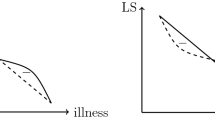Abstract
In this paper the author attempts, as far as possible, to explain the subjective variable ``life satisfaction'' by the objective variable ``income''. The reason for this is that the effect of the objective living conditions on the subjective feelings of people has been found to be very small. Much to the surprise of the author, a considerable effect of the objective variable has been found in a Russian panel study where it was possible to use lagged variables as suppressor variables and to correct for measurement errors in the different variables. This result lends considerable support for the dynamic equilibrium model as an explanatory theory of satisfaction.
Similar content being viewed by others
REFERENCES
Anderson, T.W. and Y. Amemiya: 1988, ‘The asymptotic normal distribution of estimators in factor analysis under general conditions’, The Annals of Statistics 16, pp. 759-771.
Andrews, F.M.: 1984, ‘Construct validity and error components of survey measures: A structural modelling approach’, Public Opinion Quarterly 48, pp. 409-422.
Bollen, K.A.: 1989, Structural Equations with Latent Variables (Wiley, New York).
Campbell, A., P.E. Converse and W.R. Rogers: 1976, The Quality of American Life (Russel Sage Foundation, New York).
Clark, A. and E. Diener: 2000, Lags and leads in life satisfaction: A test of the baseline hypothesis. Paper presented at the ISQOL conference, Girona, July, 2000.
Clemente, F. and W. Sauer: 1967, ‘Life satisfaction in the United States’, Social Forces 54, pp. 621-631.
Costa, P.T. and R.R. McCrae: 1980, ‘Influence of extraversion and neuroticism on subjective well-being’, Journal of Personality and Social Psychology 338, pp. 668-678.
Costa, P.T. and R.R. McCrae: 1984, ‘Personality as a lifelong determinant of well beeing’, in C. Malatesta and C. Izard (eds.), Affective Processes in Adult Development and Aging (Sage, Beverly Hills).
Cummins, R.A.: forthcoming, ‘Normative life satisfaction: Measurement issues and a homeostatic model’, in B. Zumbo (ed.), Methodological Developments and Issues in Quality of Life Research (Kluwer, Amsterdam).
Davis, J.: 1984, ‘New money and old man/lady and two's company' subjective welfare in the NORC general social surveys, 1972–1982. Social Indicators Research 15, pp. 319-350.
Fisher, J.E., M. Arnold and J. Mullins Beggs: 2000, Income, economic well-being and happiness. Paper presented at the ISQOL conference, Girona, July, 2000.
Heady, B. and A. Wearing: 1991, ‘Subjective well-being: A stock and flows framework’, in F. Strack and M. Argyle and N. Schwartz (eds.), Subjective Well-being (Pergamom Press, Oxford), pp. 49-77.
Heise, D.: 1969, ‘Separating reliability and stability in test-retest correlation’, American Sociological Review 34, pp. 93-101.
Herodotus: (1954 edition), The Histories (Penquin Books, London).
Herzog, A.R. and W.L. Rogers: 1981, ‘Age and satisfaction: Data from several large surveys’, Research on Agin 3(2), pp. 142-165.
Inglehart, R.: 1990, Culture Shift in Advanced Industrial Society (Princeton University Press, New Jersy).
Inglehart, R. and J-R. Rabier: 1986, Aspirations adapt to situations-but why are the Belgians so much happier than the French? in F. Andrews (ed.), Research on the Quality of Life (Ann Arbor).
Jöreskog, K.G. and D. Sörbom: 1989, Lisrel VII: Users Reference Guide (Scientific Software, Mooresville).
Mastekaasa, A. and T. Moum: 1984, ‘The perceived quality of life in Norway: Regional variation and contextual effects’, Social Indicators Research 14, pp. 385-419.
Michalos, A.C.: 1985, ‘Multiple discrepency theory’, Social Indicators Research 16, pp. 347-413.
Robinson, J. and P.R. Shaver: 1973, Measures of Social Psychological Attitudes (Institute for Social Research, The University of Michigan, Ann Arbor).
Saris, W.E.: 1996, ‘Integration of data and theory: A mixed model of satisfaction’, in W.E. Saris, R. Veenhoven, A.C. Scherpenzeel and B. Bunting (eds.), A Comparative Study of Life Satisfaction in Europe (Eötvös University Press, Budapest), pp. 281-299.
Saris, W.E. and H. Stronkhorst: 1984, Causal Modelling in Nonexperimental Research: An Introduction to the Lisrel Approach (SRF, Amsterdam).
Saris, W.E. and A. Munnich: 1995, The Multitrait Multimethod Approach to Evaluate Measurement Instruments (Eotvös University Press, Budapest).
Saris, W.E., R. Veenhoven, A.C. Scherpenzeel and B. Bunting (eds.): 1996, A Comparative Study of Life Satisfaction in Europe (Eötvös University Press, Budapest).
Satorra, A.: 1990, ‘Robustness issues in structural equation modelling: a review of recent developments’, in W.E. Saris (ed.), Structural Equation Modelling, Quality and Quantity 24, pp. 345-267.
Schuyt, C.J.M.: 1995, Tegendraadse Werkingen (Amsterdam University Press, Amsterdam).
Scitovsky, T.: 1976, The Joyless Economy: An Inquiry into Human Satisfaction and Consumer Dissatisfaction (Oxford University Press, New York).
Strack, F., L.L. Martin and N. Schwarz: 1988, ‘Priming and communication: social determinants of information use in judgments of life satisfaction’, European Journal of Social Psychology 18, pp. 429-442.
Vaughan, D.R. and C. Lancaster: 1980, ‘Income levels and their impact on two subjective measures of well-being: some early speculations from work in progress’, 1979 Proceedings of the Social Statistics Section, American Statistical Association. Washington D, pp. 271-276.
Veenhoven, R.: 1984, Conditions of Happiness (Reidel, Dordrecht (reprinted 1991 by Kluwer Academic)).
Veenhoven, R.: 1994, Correlates of Happiness. RISBO, Studies in Social and Cultural Transformation 3. Erasmus University Rotterdam, Netherlands (Free electronic version: ftp.eur.nl pub/database.happiness/correlat).
Veenhoven, R.: 1996, ‘The study of life satisfaction’, in W.E. Saris, R. Veenhoven, A.C. Scherpenzeel and B. Bunting (eds.), A Comparative Study of Life Satisfaction in Europe (Eötvös University Press, Budapest), pp. 11-49.
Wiley, D.E. and J.A. Wiley: 1970, ‘The estimation of measurement error in panel data’, American sociological Review 35, pp. 112-117.
Author information
Authors and Affiliations
Rights and permissions
About this article
Cite this article
Saris, W.E. The Relationship between Income and Satisfaction: The Effect of Measurement Error and Suppressor Variables. Social Indicators Research 53, 117–136 (2001). https://doi.org/10.1023/A:1026785328244
Issue Date:
DOI: https://doi.org/10.1023/A:1026785328244




